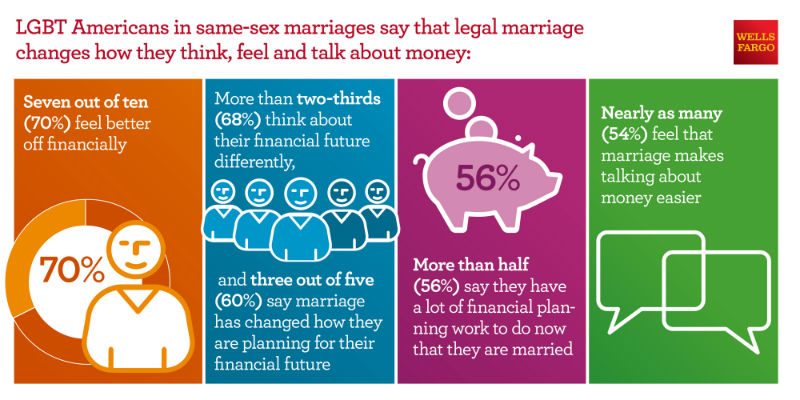New Wells Fargo survey reveals marriage equality has altered the way in which LGBT Americans plan for their future.
A new survey conducted by Versta Research from Wells Fargo & Co. of LGBT Americans has revealed that the June 26 marriage equality ruling has had an impact on the ways in which LGBTs are visualizing and planning for their futures.
While love and commitment was the primary reason for getting married, a vast majority of those surveyed (86%) said that marriage equality will improve the financial lives of same-sex couples, with 50% citing financial security and benefits as a top reason for wanting to get married.
But while LGBT Americans recognize that access to marriage provides certain financial benefits and obligations, “there is still a significant knowledge gap around specific issues,” says John Lake, Wells Fargo LGBT Segment Manager.
“Having conversations about financial issues like saving, investing, and preparing for retirement is critically important for same-sex couples. There are many unanswered questions out there, and as an industry we must keep working hard to provide useful information same-sex couples need in order to achieve their financial goals,” Lake added.
While the survey showed that 81% of LGBT Americans see getting married as a big financial decision, just 32% say they fully understand the financial implications of doing so, and even fewer (29%) fully understand how Federal and state laws apply to same-sex marriages in their states. Most survey respondents do not fully understand all the legal implications of being married versus living together in several specific areas related to money and planning.
Over 70% did not understand how legal marriage affects access and rights to workplace pension benefits or how legal marriage affects rights to inherit money from a spouse.
While more LGBT couples than straight couples have a financial advisor, less than 18% consulted with a financial or legal professional before getting married. And around 19% have disagreements about money at least monthly, while 30% admit that discussions about finances have caused tension in their relationships.
Before Saying “I Do,” Ask Yourself These Questions:
- Will marriage benefit you financially?
- Have you discussed the pros and cons of marriage with your partner?
- Should you merge your accounts and assets?
- What are your personal feelings about money?
- What personal debts and obligations do you have?
- What is your earning power and what is your approach to investments?
